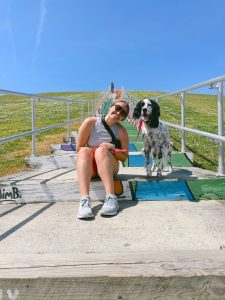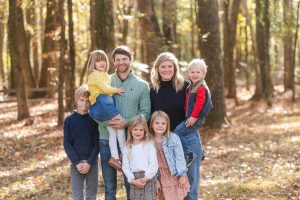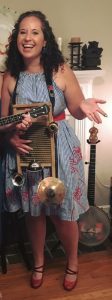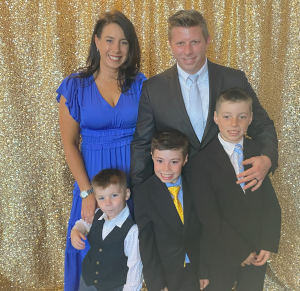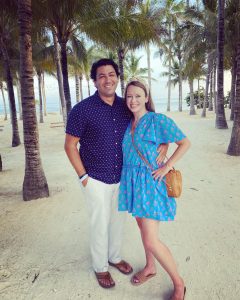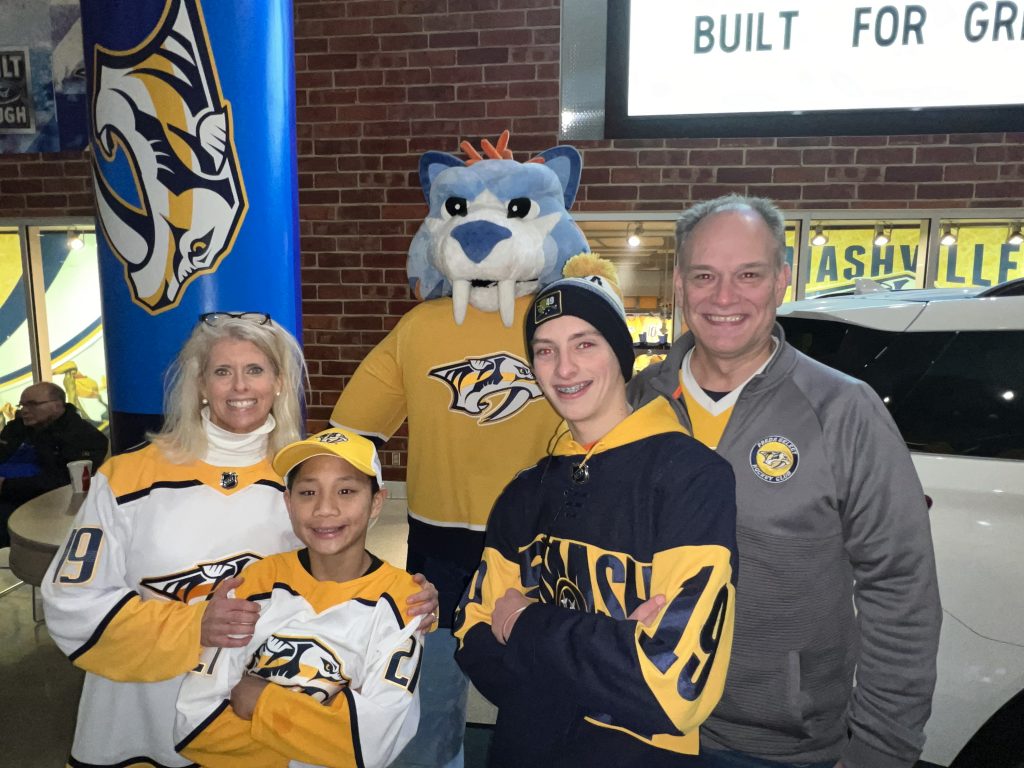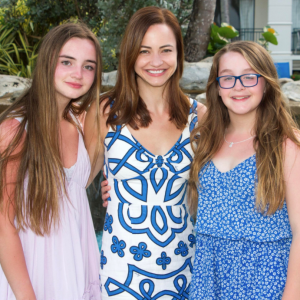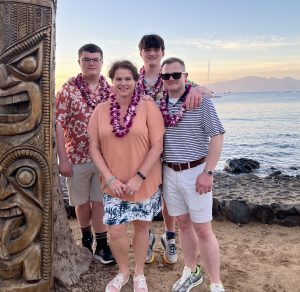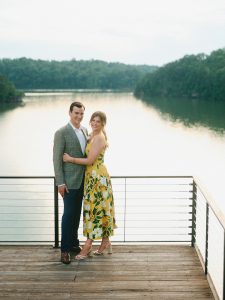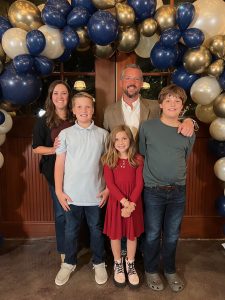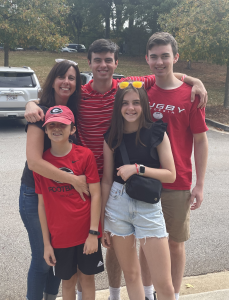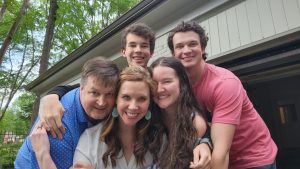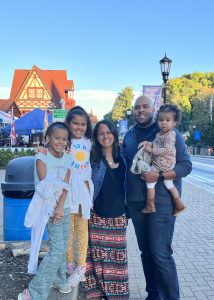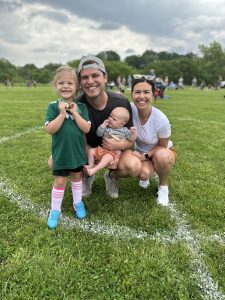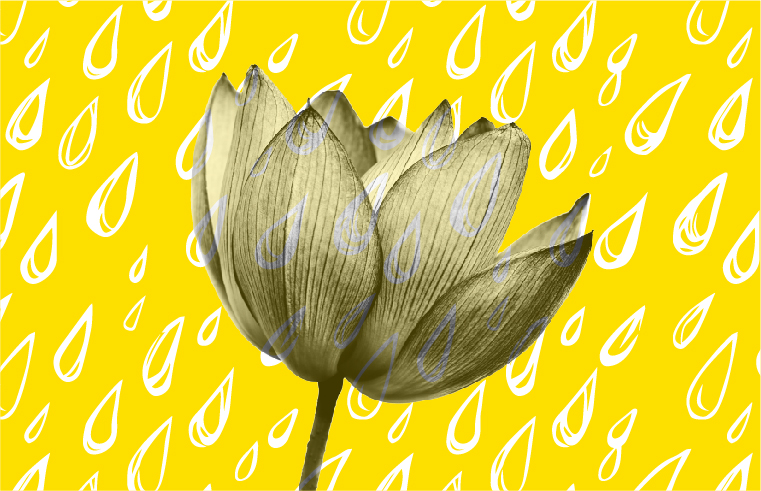
By Marissa Loper
Six months ago today was my 43rd birthday. It was also the day I wrote my father’s eulogy.
So today I’m taking a break from blogging about work-related topics I love (like branding, marketing and communications) to write about what my father went through and how my family coped.
Warning: You won’t find rainbows and unicorn glitter in this post. It’s about real life, real suffering and real loss. And I’ve labored over every word.
Writing down these thoughts has certainly helped me sort through my emotions, but my true prayer is that this post will help another family who finds themselves in a similar situation.
Okay, that’s enough of a preamble. It’s time to tell the story.
My hero is in Heaven.
Michael Thomas Murphy (known as “Dad” or “Daddy” to his four adoring children and “Big Daddy” to his eight grandchildren) died on May 1, 2020. On May 6, we celebrated Dad’s life in a nearly empty church with our family trying our best to practice this new idea called “social distancing” while more than 1,000 people watched the service on YouTube.
The wonderful obituary my brother penned didn’t contain the phrase “he died peacefully in his sleep” because that would have been a lie. Dad fought so very hard, right up until the end.
Here’s a condensed health history to give you a bit of context: While the world was just beginning to understand the implications of COVID-19, my father was battling two cancers: multiple myeloma (cancer in his bone marrow) and sarcoma (cancer in his connective tissue).
With his ever-present positive attitude and unstoppable spirit, over the prior year Dad had already survived countless rounds of chemotherapy, radiation and even an incredible bone marrow transplant to fight the multiple myeloma. Then we discovered he also had sarcoma.
The oncologist gently asked Dad if he wanted to fight this new cancer after having already been through so much. Without missing a beat, my father looked right at him and said, “Yes. Absolutely. I want to see my grandchildren grow up.”
So he fought. Shortly after the surgeon removed the tumor in Dad’s thigh, the sarcoma spread to his lungs. Dad barely survived the intense, three-day chemotherapy treatment they gave him in the hospital to combat this new crisis.
Because it would have required multiple rounds of that same extreme chemo to break up the cancer in his lungs, the oncologist tearfully explained to us that Dad’s condition was terminal, and he recommended stopping treatment. Hospice care, he added quietly, would ensure Dad would be comfortable and would not suffer in his final days.
We were, in a word, devastated.
A new goal emerged: Get Dad stable enough to move him from the hospital to his home for hospice treatment. We feared the ICU would soon be overflowing with COVID-19 patients, so we were grateful when we got the go-ahead to transport Big Daddy home via ambulance.
Dad arrived home on March 12, 2020. President Trump declared COVID-19 a national emergency the next day.
When my body was in Memphis, my heart was in Birmingham.
I grew up in Birmingham, but I live with my husband and our three children in Memphis—a little more than three hours away by car. That spring, I spent a lot of time in my parents’ home.
Since I live out-of-town, the daily burden of caring for Dad fell on my mother and my siblings, and I felt guilty when I wasn’t there to help.
And when I was in Birmingham, I hated being away from my husband and children. Someone described it to me once as feeling like you’ve been sandwiched—needing desperately to care for your parents and your children at the same time. And I felt that I wasn’t doing either very well.
My dad not only taught me how to live, he showed me how to die.
Because of the amount of tissue removed from his thigh and how long he had been confined to the bed, Dad was unable to use his legs. He spent his time either in his bed or in the living room chair (thanks to the help of a handy contraption called a hoist).
At the time I remember deeply feeling the irony of my friends who were vocal on social media about the hardships of being confined to their houses during COVID. My dad couldn’t even walk, but I never heard him complain. Not once.
What I found truly remarkable was that, even on his worst days, my father never stopped smiling and being his kind, positive, optimistic self. I have never been prouder of a human being than I was of my father in his final days. I could tell Dad was trying his best to make things a little easier on his family, and I admired his refusal to become angry, bitter or depressed.
Nothing could have prepared my family to watch someone we love so deeply suffer so much.
While I will always be grateful for the quality time I spent with my parents during those months, I realize now how traumatic it was on all of us. Witnessing Dad’s decline was torture. Every night I would cry myself to sleep in their guest bedroom.
I have no idea how my mother held it together. She rarely left the house herself because of COVID, and for the same reason none of her friends could drop by for a quick visit or even whisk her away for dinner or a movie. I understand that these situations are always somewhat isolating, but because Mama was caring for her very sick husband during a global pandemic, she was truly alone most of the time. It was heartbreaking. My mother is one incredible woman, that’s for sure.
Just a few days before Dad passed away, I traveled to Birmingham to see if I could help Mom sort out the medications Dad needed to be comfortable. Now I should note here that I have zero medical training but some decent organizational skills and an overabundance of resolve, so I brought my notepad and pen and pretty much asked the hospice nurse to put me through medical school that day.
Which meds should we give Dad when he couldn’t stop coughing? If he falls asleep, should I wake him up to give him the next dose? How much pain medication is too much? Why doesn’t he ever seem to be comfortable? What’s the best way to counteract his anxiety? Are there warning signs to look for when a person is about to die?
I really grilled that poor nurse, and he patiently answered each question.
Finally, the nurse looked at me and my mother and my sisters and said, “There is another option, you know.”
No, we didn’t know.
He explained that only a few miles away was a small hospice care facility. We could move Dad there, and he would have his own private room. Dad would receive around-the-clock, professional nursing care and would have access to more powerful medications that could help him rest. We could visit him any time.
I turned to my mother. She was sobbing. She nodded her head and said, “Yes. Let’s take him there. I want him to receive the care he needs and deserves.”
The nurse left the room to call for an ambulance and to alert the hospice facility that Dad was coming.
When he came back into the room, he looked so dejected. He pulled me aside.
“I am so sorry. I was wrong. There are new regulations that I didn’t know about. Your father will only be allowed to have two visitors.”
“Not a problem,” I told him. “We’ll take turns.”
“No, you don’t understand. Because of COVID restrictions, your dad will only be able to have one visitor at a time and only two visitors total. And they must be the same two visitors. I am so, so sorry.”
He looked at me apologetically and let the news sink in.
“So what you are saying is, I have to say goodbye to my father right now?” I asked. The nurse just nodded his head and graciously looked away while reality hit my heart.
The ambulance was pulling into the driveway. I waited my turn to talk to Daddy, then I jumped in for a hug. I am not even sure exactly what I said, but I know I told him how much I loved him. And that was all I really had time to say before the EMTs loaded Daddy into the ambulance and transported him to the hospice facility.
The next morning, with a heavy heart, I packed up and drove back to Memphis, praying the whole time that God in His grace and goodness would take my father to Heaven and heal him there.
My father died the following day. He was 71 years young.
So what did I learn?
A lot.
So much.
Enough to cover a series of blog posts.
But I’ll share just a few of the biggies here.
Advocate tirelessly for your loved one. While your whole world may revolve around one sick person, it turns out that doctors and nurses are caring for countless sick people at the same time. The demands of their job can be overwhelming, and sometimes things accidentally slip through the cracks. That’s why advocating for your person is so crucial. My family and I learned how to read the machines that were monitoring Dad’s vitals. If Dad’s numbers slipped or if he was thirsty or hungry or needed medicine or fresh linens, we made it our job to find a nurse to help. We felt like nurse stalkers. (We also showered those nurses with praise and gratitude. Nurses are absolute saints.) We swallowed our pride about our ignorance and asked Dad’s caretakers and medical team to slow down, clarify or explain treatments until we understood. When Dad was at home and Mom hired sitters to help with his care, my siblings and I created a notebook that we named “Who’s Who in the Murphy Zoo.” Inside we included details about my father’s preferences, talked about his illness and featured photos and facts about each person in the family who might show up on a given day and how that person is related to Dad. Fun fact: We also included my parents’ dog Flossie, who is honestly their fifth (and likely favorite) child.
If you aren’t a doctor, become a scribe. You know, my parents had four children, and not a single one of us went to medical school. Can you believe that? A doctor in the family would have been so handy. But no such luck. We’re a bunch of creatives and educators. So we put our non-medical skills to good use. Whoever was with Dad would text details to the rest of us. Sharing what we knew was critical, particularly since we took turns at the hospital and then later took shifts with Dad at home. We kept extended family informed of what was going on, too. Thanks to COVID, Dad’s siblings couldn’t visit, so I texted my aunt and uncle frequently. (This particular communication string turned out to be such a blessing, by the way. Reconnecting with them, even under the circumstances, was so much fun. I will always be grateful.) Also—and I can’t recommend this tip enough—we found it very helpful to keep up with key dates and milestones on a single piece of paper. Endless days in hospitals and at home became a blur. We lost our sense of time. We needed to be able to tell Dad’s story to each new specialist or caregiver we encountered, and those people would ask us when events occurred. Thank goodness for our cheat sheet!
Let your people love on you. This one is hard. A disease like cancer can be long and drawn out, and I began to feel guilty that people continued to reach out and want to help. But oh, we needed that help. Our friends prayed for us regularly, and we coveted those prayers. People sent over meals—homecooked and purchased from our favorite restaurants. My friends kept me stocked up with Dr. Pepper and red wine. (My friends know me well.) My mother’s friends dropped off toilet paper, which was truly a special gift at that time! After Dad died, a friend of mine from church had groceries delivered to my home that my picky teenagers would like, and she also included lavender bath salts just for me. So thoughtful! Notes and cards in the mail made us feel a little more connected to the outside world, even when we were so very isolated. Text messages and phone calls were like rays of sunshine. My family and I treasured every little act of kindness. Our people helped us get through.
Hospice care is really hard. I’m not sure if my lack of understanding of hospice came from something I saw on TV or in a movie, but it definitely looked different in reality. I thought there would be a nurse in my parents’ home that took care of Dad around the clock. Nope. Once a week, a hospice nurse checked in on Dad. And once a week, a different nurse would come over to bathe Dad. Everything else was up to us. And that was terrifying. I’m not qualified to change a Band-Aid, but I somehow had to learn how to drain fluid from my father’s lungs. I gave him medications. I decided when it was time to call the 24-hour hospice line (thank God for that resource!) to ask for different medications or for advice on how to help Dad. I have never been so unsure of something so very important. In my head, I think I had glamorized the idea of dying at home. While having Dad at home did make it easier for us to be with him in his last days (particularly with all of the COVID restrictions at the hospital), it was very, very, very hard and scary.
Some people do not die peacefully in their sleep. Some people do, and I am genuinely glad for those people and their families. I think everyone would prefer to pass calmly from this life to the next. What I didn’t know is there is a medical condition called terminal restlessness. Some people at the end of their lives experience anxiety, agitation and the lack of ability to be comfortable. I had no idea this was even a thing. Every doctor we spoke to had assured us that hospice care would mean Dad would be comfortable. So when he was anything but comfortable during the last week of his life, I assumed we had him on the wrong medications. I was overcome with guilt that I didn’t know how to make him feel more at ease. Finally a nurse gave what my father was experiencing a name, and when I looked it up, I realized that Dad’s symptoms are fairly common in terminal cancer patients. We were not giving Dad inferior care, and that at least was a relief. I was also able to call a couple of my friends whose parents have terminal cancer to warn them that this is a possibility, and they were grateful for the knowledge.
Be creative with the time you have. Dad and I spent long stretches of time together, and we managed to have some fun despite the circumstances. While I am an unsteady and unskilled nurse, I am pretty good at distracting a person from pain, telling stories, asking questions and making people laugh. One day when Dad was feeling pretty yucky, I ran a harebrained idea by him. He agreed to it. So I posted a selfie of the two of us on Facebook, mentioned that we were feeling a little lonely, and asked my friends (and his) to pose questions to my fun and wise father about anything they wanted to know. We called it “Ask Mike.” Our friends delighted us with their questions! Dad would answer the questions out loud and I would transcribe his answers to the post. I learned so much about my dad that day—including why his father named him Mike and why he admired the artist Michelangelo. Sometimes when I am really missing Dad, I pull up that post and read a few of the stories he shared that day.
It’s okay to be sad about what you’re missing. Last spring I felt selfish and guilty that I was sad about missing things that were happening at home. I especially was bummed during my daughter’s volleyball tournaments. I knew there would be plenty of volleyball in my future and that I was focused on the right thing, but I found myself getting irritated with myself when I longed to be cheering on my daughter instead of sitting with my father. Often I wished I were curled up beside my husband or laughing with our sons, and then I would chastise myself for feeling that way. My advice now? Drop that guilt and let yourself be sad when you need to be sad. Feeling sad doesn’t make you a bad person. It makes you a real human being.
Be grateful for the benefits of cancer. Yes, you read that correctly. As horrible as cancer is, there are a few benefits. Unlike a fatal accident or a heart attack, we knew the end was coming, so we could (somewhat) prepare for it. My dad planned his entire funeral. He picked out the hymns and the verses and even told the pastor that he wanted each of his four children to deliver a eulogy. What a blessing! We knew exactly what Dad wanted, and we were able to honor all of his wishes. We also were able to get some of his affairs in order to prepare Mom (a little) for life without him. I had time to tell my daddy just how proud I was of him, and he told me how much he loved me. We left no words unsaid. That is a huge blessing. I am so very grateful.
If you’ve made it this far into the post, wow, thank you. I know it’s a lot to digest.
And if you are going through something similar, please don’t hesitate to reach out to me. I’m happy to share what I know or just sit still and listen. I would also be honored to pray for you.
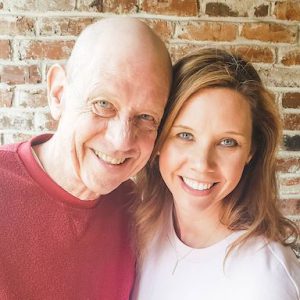
I love you big time and always, Daddy!

